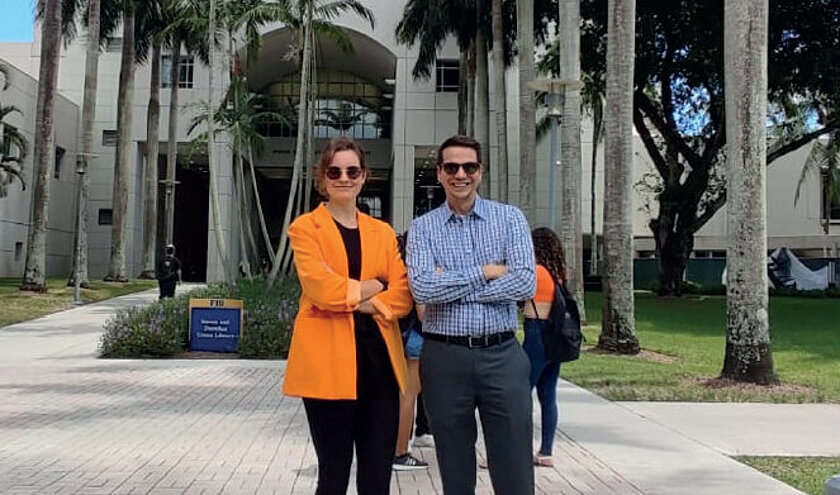Strategic Information Management (MSc)
How can key positions between business and IT be managed efficiently?
Would you like to introduce, utilise and manage digital technologies in such a way that they optimally support the day-to-day business of companies, enable growth and enable a proactive response to change?
This interdisciplinary, practice-oriented and English-language degree programme trains you to become a manager who works at the interface between business and IT. You can contribute to shaping organisations and technologies in such a way that the greatest possible value is generated - for example, through the strategic management of digital technologies as well as digital processes and business models. You will use innovative IT-based services and products and effective knowledge management.
You will develop a skills profile in the following areas
- Strategy
- IT management
- Business processes
- Technology & Software
- Leadership
This enables you to take on management positions in consulting or in medium-sized and large companies in the areas of digitalisation, IT management or corporate development.
This Master's degree course offers an excellent opportunity for graduates with a background in business informatics, economics or technology to qualify for management positions in the fields of digitalisation, IT management and corporate development.
Admission and application
Admission requirements
- Completed university studies with at least 210 ECTS (University degree does not reach 210 ECTS)
- Grade 2.5 or better
- A total of 20 ECTS from the fields of object-oriented programming, database systems, IT management and business administration, each amounting to at least 5 ECTS from a previous university studies at a state or state-recognized German or foreign university.*
- English B2
- For international applicants: German A1
(The language certificate must be submitted at the latest at the time of enrolment. Upon request, the certificate can be submitted later during the first semester). - The programme is approval-free
Application period
Winter semester: 02.05. – 31.08.
For non-EU applicants:
Winter semester: 02.05. – 15.07.
The programme is only offered in the winter semester.
Application portal
Please use the application portal by the above deadlines to apply to this programme.
Questions about admission and application
How do I apply for the programme?
To apply for this master program you have to register at the online portal on our website. Unfortunately it is not possible to check the content without an application. Detailed application deadlines can be found on this page in the "Admission and application" section.
The following documents must be submitted by the application deadline at the latest:
- Application form
- Curriculum vitae
- A copy of your high school certificate with translation
- A copy of your bachelor degree with at least 210 ECTS Points and a final mark 2.5 or better. It is necessary that you finish your bachelor before ends the application deadline.
- Proof of 20 ECTS, of which 5 ECTS each come from the areas of object-oriented programming, database systems, IT management and business administration. As part of our application process, we will check this knowledge. For this purpose, we need the transcript of grades and the corresponding excerpts from the module handbook.
- Proof of English knowledge level B2
- Proof of German knowledge level A1. This certificate we will need at latest by our enrollment process. Upon application, proof of level A1 can be submitted later during the first semester.
- All applicants who have not obtained their Bachelor's degree in Germany must upload their certificates via the uni-assist online portal for further checks. Detailed information about the necessary documents you find at the website www.uni-assist.de
Further information on application and admission for International degree seeking students can be found on the following page: Application for international students
What qualification is required?
In order to be admitted, you must have a degree from a university or university of applied sciences with a minimum of 210 ECTS credits (or an equivalent degree).
If you completed your degree outside of the German school system, please take note of the additional rules for applying with an international degree.
I did not earn the required 210 ECTS credits with my degree. What can I do?
The following text provides an overview of the key points from the Enrollment Statutes. In case of deviations, the text of the enrollment statutes (opens in a new window) is binding.
In the case of a Bachelor's degree with only 180 ECTS credits, the existing qualification gap of 30 ECTS credits must be filled by proving or successfully completing one of the following prior achievements:
- Co-authorship of a research publication in English (research paper).
- At least 6 months of verifiable full-time professional experience after obtaining the bachelor's degree in an occupation relevant to the study content of the degree program (evidence by employment contract and/or employment references)
- Successful completion of an admission examination in the form of a written scientific paper in English.
Deadline for submission of the paper:
Winter semester: 31.8.
Summer semester: 4.3.
You apply for participation at the latest 1 month before the deadline in English and solely by e-mail to the head of the respective degree programme.
Please contact the head of the degree programme for the provision of such proof:
- Proof of additional subjects taken amounting to 30 ECTS from a previous degree programme
What average mark is required?
The average mark on your transcript from a university or university of applied sciences must be 2.5 or better.
If you completed your degree outside of the German school system, please take note of the additional rules for applying with an international degree.
How can I improve my bachelor grade? (Admission test: TM-WISO)
It is optionally possible to take a voluntary entrance test (TM-WISO) to improve the bachelor's degree grade.
In principle, the test can be taken as long as you wish before you start your studies or complete your bachelor's degree. It is valid for all future applications. At HNU, you will achieve the following with the test: If you belong to the best 60%, your Bachelor final grade will be improved by 0.3, if you belong to the best 50% by 0.5 and if you belong to the best 40% even by 0.7.
For more information about the test, visit the Institute's site:
Institute for Test and Talent Research (opens in a new window)
The registration for the test "TM-WISO" is possible on the following page of the institute:
Registration for TM-WISO (opens in a new window)
What previous content knowledge do I need?
Skills in object-oriented programming in Java, relational database systems, IT management and business administration must be demonstrated. For each field, at least 5 ECTS must have been acquired in a previous university course at a state or state-recognized German or foreign university.
Specifically, we expect the following skills:
- Ability to develop (simple) applications based on object-oriented programming paradigms in Java
- Ability to design and model data structures and implement them in relational database systems
- Basic knowledge of essential concepts of information and IT management (information systems, business processes, modeling, integration concepts, application systems, IT strategy and IT governance, IT sourcing)
- Knowledge of basic concepts of business administration (constitutive decisions, value creation, financing, accounting, marketing)
If you cannot prove your competencies in one or more fields through ECTS from previous university studies, we offer a preliminary oral examination. We provide materials to prepare for the exam.
To have enough time to prepare, you should notify us as early as possible if you would like to take the preliminary exam.
Are there courses of study with which I automatically fulfill the required 20 ECTS?
Yes, if you have completed your Bachelor's degree at HNU in one of the following degree programs:
- Business Information Systems
- Information Management Automotive
- Information Management and Corporate Communications
- Digital Enterprise Management
- Data Science Management
How can I make up missing competences of 20 ECTS from the required areas?
If you cannot provide the 20 ECTS from the areas of object-oriented programming, database systems, IT management and business administration, each amounting to at least 5 ECTS, then you can alternatively take oral exams (30 minutes each) at Neu-Ulm University. The exams take place online. To prepare for the oral exams, online pre-courses as well as self-study material are provided.
What language skills are required?
For the master’s degree programmes offered in English, you will need to submit evidence of level B2 English language skills with your application. This can be done in the following ways:
- corresponding results from a recognised language test (e.g. TOEFL, IELTS)
- evidence of adequate language skills from school or university transcripts
- completion of a degree programme that was verifiably taught entirely in English
- evidence that English is your native language
Non-native speakers of German are also required to provide evidence of German language skills at level A1 when enrolling.
Do I have to pay tuition fees?
No, the programme is free of charge. This also applies to students from other EU countries.
Semester fees are charged for enrolment and for each re-registration. Click here to find out how much they are.
Applying with an international degree
Transcript evaluation
If you acquired your university entrance qualification outside of the German school system, you will need to have your transcript evaluated via uni-assis (opens in a new window)t (opens in a new window).
To ensure a swift and smooth procedure, we recommend registering with uni-assist at least 6 weeks prior to the end of the application period.
Please apply via uni-assist e.V. (opens in a new window) and at the same time apply for your degree programme via the regular application procedure. The uni-assist evaluation does not replace the HNU application process!
Click here for further information.
Language requirements for programmes in the German language (all bachelor’s degree programmes + MAM)
To enrol in any of the programmes in which the predominant language of instruction is German, you will need to provide evidence of German level C1 language skills. Evidence of your language skills can be provided, for instance, with the following certificates:
- German Language Exam for University Admission (Deutsche Sprachprüfung für den Hochschulzugang – DSH): a minimum of DSH-2
- Test of German as a Foreign Language (TestDaF): a minimum of TDN 4 in all sub-tests
- German Language Diploma from the Conference of Ministers of Education and Cultural Affairs (Deutsches Sprachdiplom der Kultusministerkonferenz – DSD): DSD II
- Goethe Certificate C2 (Goethe-Zertifikat C2: Großes Deutsches Sprachdiplom – GDS)
- telc Deutsch C1 Hochschule
Preparation courses for language tests are offered at:
- Studienkolleg Coburg (Preparatory College)
- Augsburg University of Applied Sciences
- Ulm University
Language requirements for programmes offered in English (BIA, ICCMM, IEIM)
For the programmes offered in English, you will need to submit evidence of B2 level English language skills with your application. This can be done in the following ways:
- corresponding results from a recognised language test (e.g. a 90-point minimum TOEFL-IBT, a 6.5-point minimum Cambridge IELTS, a 3-point minimum Cambridge BEC Vantage)
- evidence of adequate language skills from school or university transcripts
- completion of a degree programme that was verifiably taught entirely in English
- evidence that English is your native language
Non-native speakers of German are also required to provide evidence of German language skills at level A1 when enrolling.
About the programme
Contents of the degree programme
What distinguishes the programm?
- Interactive teaching formats and practical projects with a high proportion of teamwork
- Close integration of current scientific findings and practical problems of medium-sized companies, international corporations and consulting firms
- Teaching of current specialist and methodological knowledge as well as key interdisciplinary skills such as leadership and project management
- Students have the opportunity to complete the second semester at one of our partner universities, such as the Oulu University of Applied Sciences in Finland, the D'Annunzio University of Chieti-Pescara in Italy or the NOVA Information Management School in Portugal.
Double Degree
If you go to the D'Annunzio University of Chieti-Pescara in Italy during the international semester of the degree programme, you have the option of a double degree. Further information can be found in the following document:
Structure of the degree programme
Schedule
1st semester
- Strategic Management
- Digital Process Management
- Technology and Application Management
- Enterprise Application Engineering
- Consulting
- Interpersonal Skills
2nd semester
optional: abroad
- Business Value Creation by IT
- Disruptive Technologies
- Strategic Information Management in Practice
- Digital Leadership
- Electives (bspw. Intro to AI, Blockchain Applications for Business, Digital Innovation in Industry)
3rd semester
- Academic Writing
- Information Systems Research
- Master Thesis
Special features
Graduates of business informatics and information management degree programmes as well as of more business or technically oriented degree programmes (e.g. business administration, industrial engineering) can expand and deepen their management skills by specialising in these areas.
Career perspectives
Graduates of the program today work in key positions in strategic information management. The spectrum ranges from specialist and management roles in the planning and control of IT in international companies and organizations (e.g. as part of digitization programs, in IT project and portfolio management, in internal consulting or in IT controlling) to high-profile positions with IT-service providers (e.g. in project and quality management or product or service management) to jobs in consulting.
Language of instruction
The language of instruction in this degree programme is English.
Contributions and fees
There are no tuition fees. A semester fee (administrative fees and solidarity fee) is charged per semester. Information on this can be found on the page "HNU - Fees and Re-registration (opens in a new window)".
Contact
All study documents
Module handbooks
Study and examination regulations
- Studien- und Prüfungsordnung (SPO) SIM vom 28.06.2022 (ab WS 24)
(opens in a new window)Studien- und Prüfungsordnung (SPO) SIM vom 28.06.2022, zuletzt geändert am 15.05.2024 - Study and Examination Regulations (SPO) IEIM (valid from winter semester 2019/20)
(opens in a new window) - Kurzuebersicht_SIM.pdf
(opens in a new window) - Study and Examination Regulations (dated 28.06.2022 as amended 28.03.2023)
(opens in a new window)The following text is a commentary in English language on the Study and Examination Regulations for the Master’s Degree Programme Strategic Information Management at the Neu-Ulm University of Applied Sciences, helping you to understand the contents of the German document. The legally binding text remains the German version. Please refer to the German text if possible or seek advice in case of uncertainties.












